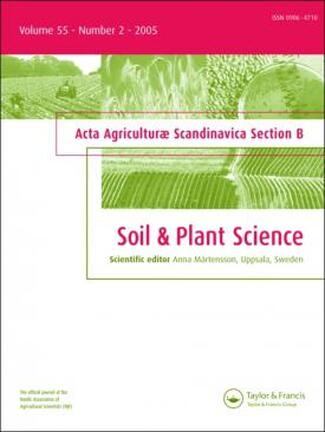 Acidic compost tea enhances phosphorus availability and cotton yield in calcareous soils by decreasing soil pH June 2021 Link Here Article Summary By: Maya Shydlowski In a fresh study published out of the Shihezi University College of Agriculture in China, researchers tested the effects of compost tea on cotton crops in calcareous soils. Calcareous soils contain high levels of calcium carbonate, which limits the utilization of phosphorus in soil. In these soils, phosphorus accumulates but is unable to be used because it is made immobile, or unavailable. Phosphorus then becomes a limiting factor in crop growth, a problem agriculture has been facing and trying to solve for decades. It is known that the pH of the soil effects the availability and uptake of various nutrients in the soil, including phosphorus. Lower pH indicates a greater acidity in the soil. The acidity helps to increase the mineralization of phosphorus. Mineralization is the process by which organic phosphorus is turned into forms easily accessible and taken up by plants. Calcium carbonate in calcareous soils raises the pH, which is why its presence in soil limits phosphorus uptake. Compost tea is generally acidic due to its components and fermentation process. Therefore, compost tea has the potential to decrease the pH of the soil and increase the mineralization and uptake of phosphorus. In this study, the researchers tested just that: They attempted to amend the effects of calcareous soils by applying compost tea. Multiple plots were set up with different management treatments to test this. One pot had an organic fertilizer, another had compost tea, another contained phosphoric acid, and another was an unfertilized control pot. Each had different pH levels, with the lowest being the phosphoric acid, followed by the compost tea, organic fertilizer, and control. These treatments were applied to potted cotton plants and fertilized over multiple months. The researchers took soil samples regularly and analyzed the plants post-harvest. They recorded the amount of phosphorus found in available, moderately available, and unavailable forms. The results showed that the treatment types had significant effects on the phosphorus content of the soil and the crops. Applying organic fertilizer, compost tea, or phosphoric acid decreased the pH of the soil. Because of this, these amendments also changed the composition of the forms of phosphorus in the soil. Both the phosphoric acid and compost tea treatments had higher levels of mobile, available phosphorus. The experiment also showed that the treatments affected the growth and yield of the cotton plants grown. Compost tea significantly increased the plant height and leaf number compared to the control treatment. The compost tea treatment had the highest cotton yield, followed by the phosphoric acid treatment, organic fertilizer, and then control. The phosphorus concentrations in the plants were significantly higher in the compost tea and phosphoric acid treatments, which corresponds to the yield findings. Overall, this study found that the acidity of the soil amendments made the greatest difference in phosphorus availability and uptake. These results show that using acidic compost tea as a fertilizer in calcareous soils can increase phosphorus uptake, improving crop growth and yield. This has positive implications for agriculture in the future. Hopefully growers will turn to compost tea as a viable amendment to better their soils and their crops.
0 Comments
|
Archives
June 2024
Categories
All
|
Contact Us
Why TeaLAB?TeaLAB is committed to helping people and their gardens to become more self- sufficient, healthier, and productive. Grow your sweetest corn, your biggest watermelon, your tallest quinoa, your tastiest tomato, and your happiest you.
TeaLAB was founded to teach people how to garden organically, so that we can become more closely connected with the land. Our goal has been to simplify growing methods so that gardeners have a positive experience in the garden. TeaLAB is where the garden meets the laboratory. From around the world and into your backyard, our products contain ingredients that are sourced both locally and globally. Using methods both ancient and cutting edge, TeaLAB promotes maximum biology. Grow with TeaLAB. |

 RSS Feed
RSS Feed
